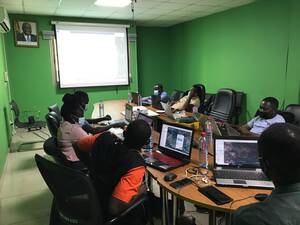Quality data leveraging Emission Reduction payments: Ghana’s zero deforestation cocoa

Ghana has received its first Emission Reduction payment from the Forest Carbon Partnership Facility (FCPF) Carbon Fund, a World Bank funding mechanism. In January 2023, the country received USD 4,862,280 for emission reductions of 972,456 tons of carbon emissions (tCO2eq), for the first monitoring period under the program (June to December 2019), achieved by reducing emissions from deforestation and forest degradation, and enhancing carbon removals through afforestation and reforestation in Ghana’s Cocoa Forest landscape.
Since 2018, with funding from the World Bank, FAO has been supporting Ghana’s Forestry Commission to improve the quality and accuracy of Ghana’s data on deforestation, forest degradation and enhancement of forest carbon stocks. Ghana submitted its First Monitoring Report to the Carbon Fund in 2021 with results for the second half of 2019 and successfully finalized the verification and validation in August 2022.
The country has reduced emissions from deforestation and forest degradation significantly against the 2005-2014 reference level and preliminary calculations indicate that Ghana may have significantly reduced emissions also against a TREES-compliant crediting level. Ghana submitted a Lowering Emissions by Accelerating Forest finance (LEAF) proposal in 2021 and was selected as one of five countries to sign a Letter of Intent with Emergent, making it the first African country to do so. Ghana also submitted a TREES (the REDD+ Environmental Excellence Standard) Concept with FAO’s support in 2021.
Ghana used several of FAO’s open source solutions for the assessment awarded with Emission Reduction payments, such as Collect Earth and SEPAL, and the country was one of the first to get access to Planet satellite imagery to improve the accuracy of its assessment. Currently, Ghana is working on its Second Monitoring Report with support from FAO including emission reductions for the years 2020 and 2021.
Ghana’s Manager of REDD+ Programmes and MRV, Mr. Thomas Y. Gyambrah, commented: “FAO’s technical support has built capacity in our country and is enabling Ghana to meet high quality MRV requirements for the Carbon Fund Methodological Framework and even in new carbon accounting standards like ART-TREES”. Approximately 90% of the REDD+ reference level submissions to the UNFCCC have used Open Foris tools or platforms, such as SEPAL and Collect Earth desktop version.
Ghana is piloting REDD+ implementation for several years now in the Cocoa Forest Landscape, through development of a sustainable commodity supply chain. The REDD+ programme is jointly coordinated by the Forestry Commission – through its Climate Change Directorate and the National REDD+ Secretariat – and the Ghana Cocoa Board (Cocobod), forming a unique government-private sector collaboration to achieve zero-deforestation cocoa production.
Ghana’s Nationally Determined Contribution puts much emphasis on forests, and the country hopes to finance its national ambitions through rising carbon market opportunities. Ghana’s REDD+ coordinator Ms. Roselyn Fosuah Adjei commented: “the payments this technical support has helped us to unlock will be used to realize Ghana’s ambitious zero-deforestation goals while making sure benefits reach key stakeholders who have contributed to this milestone for sustainable forest management”.

Data collection worshop in Ghana. Photo credits: Frank Kwadwo Owusu.
